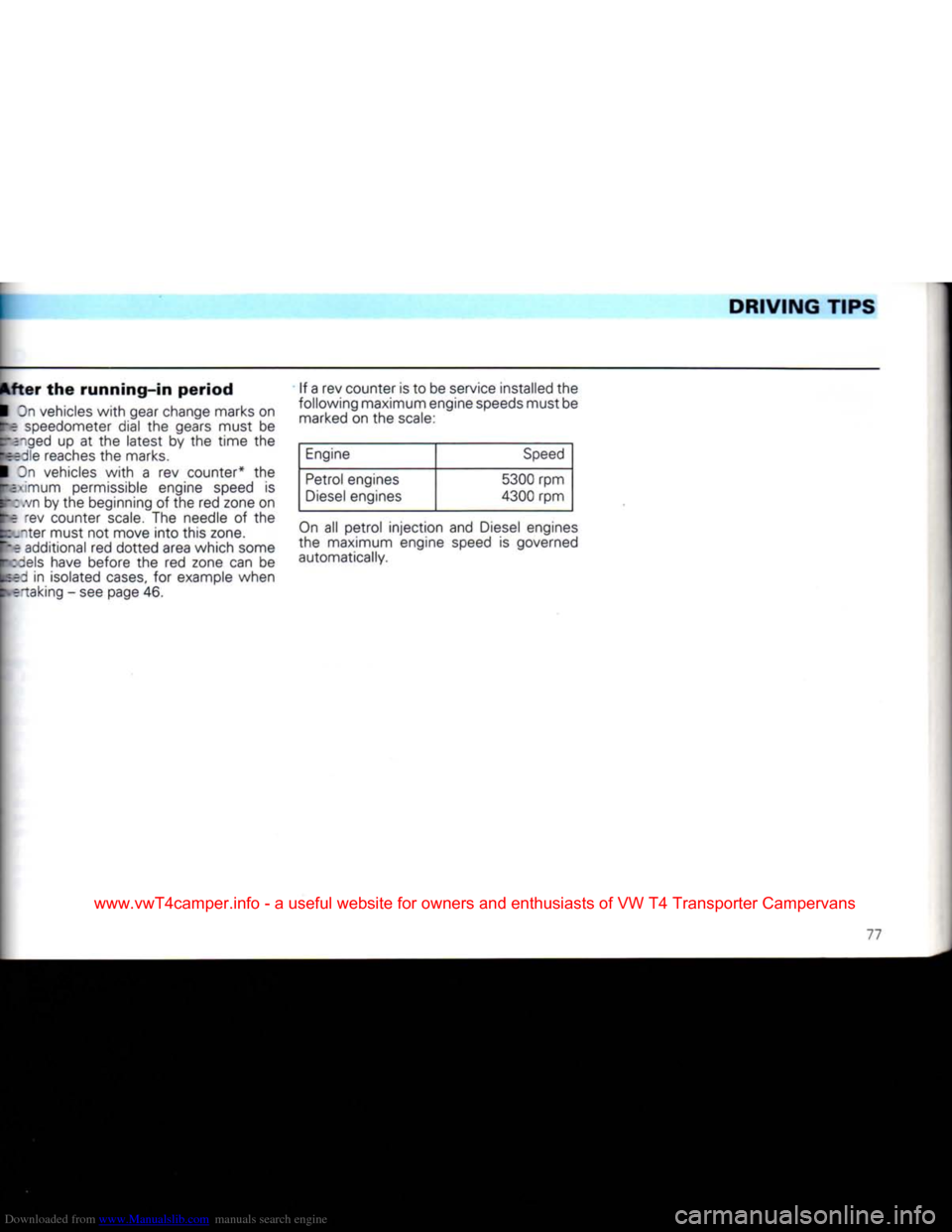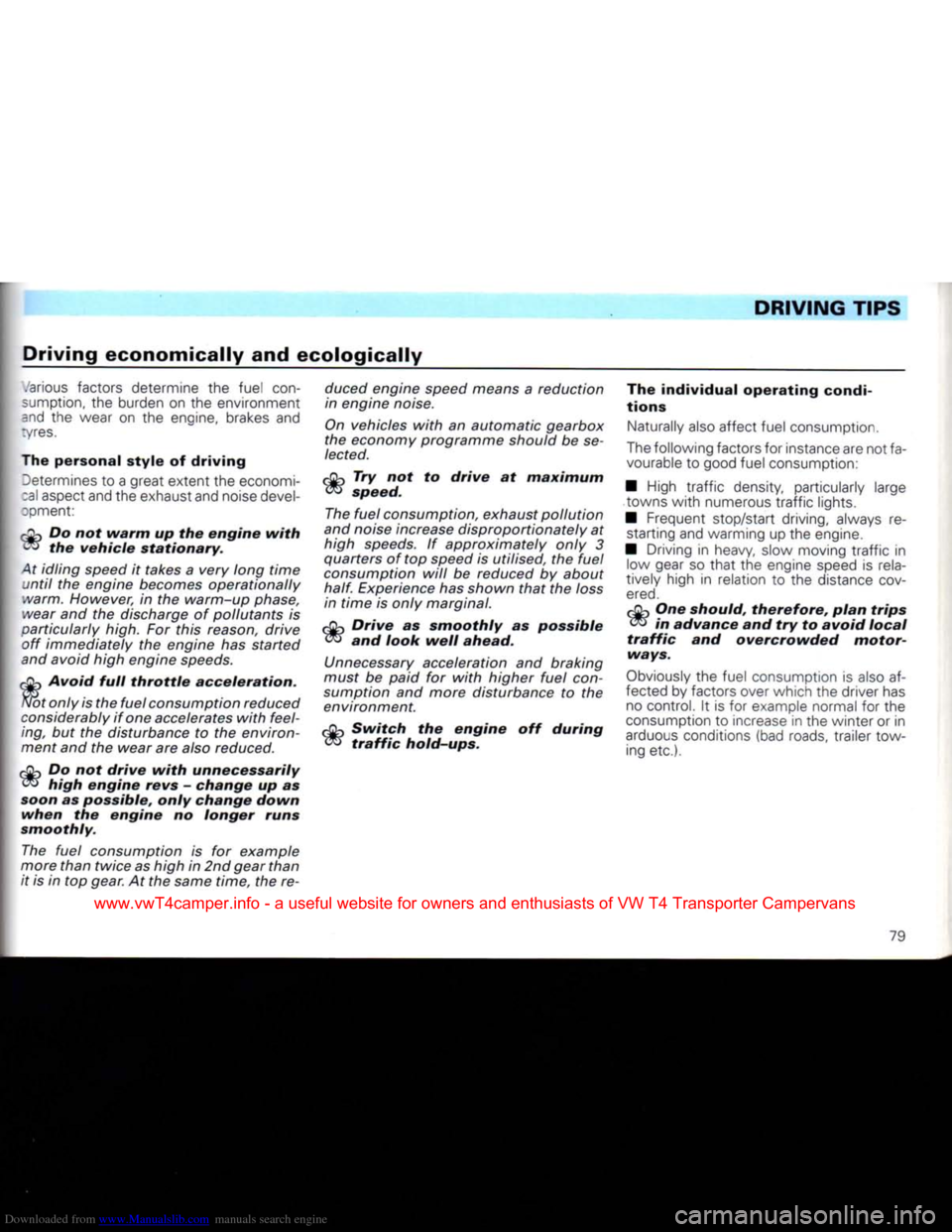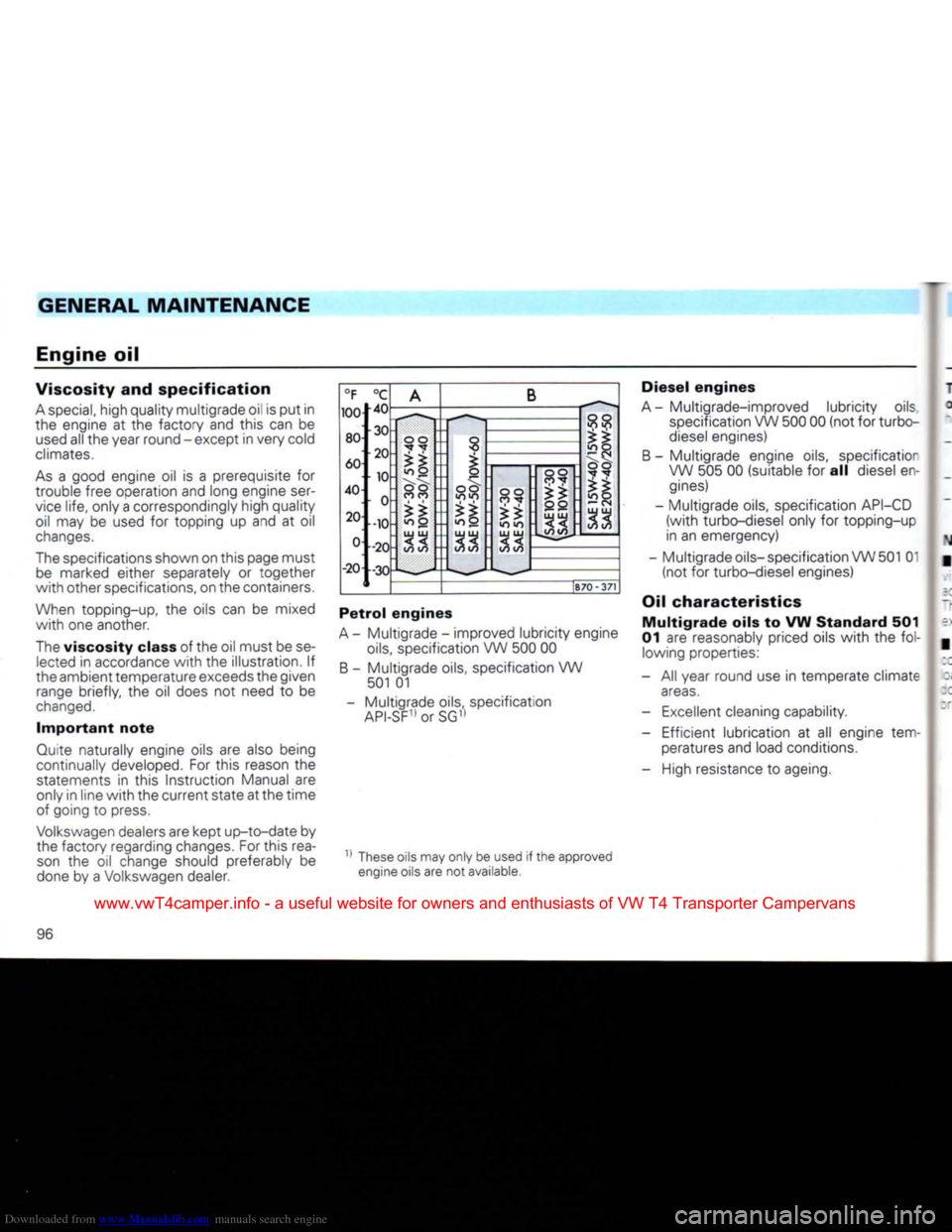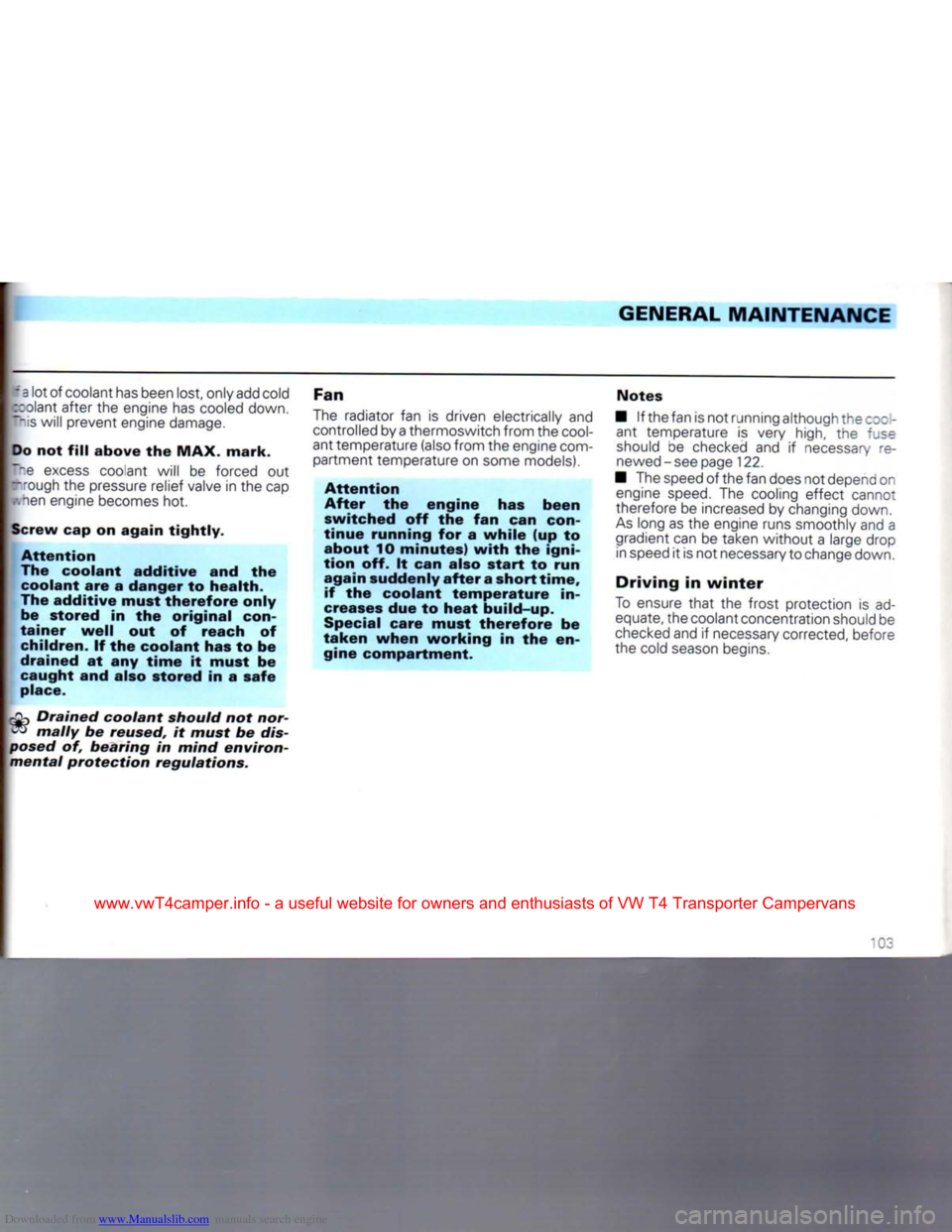1992 VOLKSWAGEN CARAVELLE change time
[x] Cancel search: change timePage 71 of 164

Downloaded from www.Manualslib.com manuals search engine
CONTROLS AND
EQUIPMENT
Switching
heater
off
• -'ess
button
9; symbol 5 disappears. '.;te
-_e"
switching off the heater the circulation
b-~o and the combustion blower con- " • ^es to run for 2 minutes.
2
jring
this
time
the
temperature
se
lector
lever
must
not be pushed to
ae
left
-
danger
that
heater
unit
will
: .
erheat!
Setting
the
pre-selected
times
•
r-ess
button
8/the
three possible pre ss ect times and the actual time can be .i ed up one after the other as follows:
r. cre-selected time
I-; ore-selected time •-z ore-selected time
jfcrjal
time
: -jltaneously the day of the week is dis-
: z.ed at each level.
::' :he initial input and for each change to
r" Did input
first
call up the corresponding
:'e-selected
time level
with
button
8. It is "en possible to set the desired pre-select
~e
at each level
with
buttons 10 or 11. If
I: Tie is set before the actual time of day,
re next day of the week appears automati- za y in the display. If a different day of the week is desired, it is
necessary
to wait
until
the week day display
flashes
before setting the new day of the
week by pressing
button
11.
The inputs are stored in the memory if no
further
inputs are made
within
about 10
sec
onds after setting a pre-select time and day
of the week. With the ignition switched on
the actual time is displayed,
with
the ignition switched off the display disappears. How
ever
the numbers 1, 2 or 3 remain in the dis
play 1 to indicate
that
a pre-selected time is
activated.
Notes
• If not activated the heater will not
start
at
the pre-selected time!
• Only one pre-selected time can ce act •
vated,
which in
turn
only runs once, r: ever, the time can be repeated by activating
again.
When doing this the input remains stored in the memory.
• The switched-on period is determined
as
described in "Switching heater on" (see previous page). If the activation (not the pre-selected set
tings!) is to be cancelled, press
button
8
until
the number in display 1 is no longer vis
ible.
69
www.vwT4camper.info - a useful website for owners and enthusiasts of VW T4 Transporter Campervans
Page 79 of 164

Downloaded from www.Manualslib.com manuals search engine
I
DRIVING
TIPS
After
the
running-in
period
I
jn vehicles with gear change marks on
~r
speedometer dial the
gears
must be
CE'ged
up at the latest by the time the
r^eaie reaches the marks.
I
Dn vehicles with a rev counter* the
r;;.;mum permissible engine speed is
r:
-vn
by the beginning of the red zone on
H
"ev counter scale. The needle of the
c.^.ter
must not move into this zone.
!"~e additional red dotted area which some
r:;e!s
have before the red zone can be
k£r3
in isolated cases, for example when
c
staking - see
page
46. If a rev counter is to be service installed the
following
maximum engine speeds must be marked on the scale:
Engine Speed
Petrol
engines
Diesel engines 5300 rpm
4300 rpm
On all petrol injection and Diesel engines
the
maximum engine speed is governed
automatically.
77
www.vwT4camper.info - a useful website for owners and enthusiasts of VW T4 Transporter Campervans
Page 81 of 164

Downloaded from www.Manualslib.com manuals search engine
DRIVING
TIPS
Driving economically and ecologically
.'arious
factors determine the fuel
con
sumption,
the burden on the environment
and
the wear on the engine, brakes and
lyres.
The personal style of driving
Determines
to a great extent the economi-
:al
aspect and the exhaust and noise
devel
opment:
jOp
Do not
warm
up the
engine
with
W» the
vehicle
stationary.
At idling speed it takes a very long
time
until
the engine becomes operationally
warm. However, in the warm-up phase,
wear and the discharge of pollutants is
oarticularly high. For
this
reason, drive
off immediately the engine has started
and avoid
high
engine speeds.
f
h Avoid
full
throttle
acceleration.
of only is the
fuel
consumption reduced
considerably
if one accelerates
with
feel
ing, but the disturbance to the environ
ment
and the wear are also reduced.
rflri
Do not
drive
with
unnecessarily
high
engine
revs
-
change
up as
soon as possible,
only
change
down
when
the
engine
no
longer
runs
smoothly.
The
fuel
consumption is for example
more
than
twice as
high
in 2nd gear
than
it is in top
gear.
At the same
time,
the re duced engine speed means a reduction
in engine noise.
On vehicles
with
an automatic gearbox
the economy programme should be se
lected.
c^p
Try not to
drive
at
maximum
TO
speed.
The
fuel
consumption, exhaust pollution
and noise increase disproportionately at
high
speeds. If approximately only 3
quarters of top speed is utilised, the
fuel
consumption
will
be reduced by about
half.
Experience has shown
that
the loss in
time
is only marginal.
c
j-,
Drive
as
smoothly
as possible and
look
well
ahead.
Unnecessary
acceleration and braking
must
be paid for
with
higher
fuel
con
sumption and more disturbance to the environment.
Switch
the
engine
off
during
hold-ups. The individual
operating
condi
tions
Naturally
also
affect fuel consumption.
The
following factors for instance are not fa
vourable
to good fuel consumption:
•
High traffic density, particularly large
.towns with numerous traffic lights.
•
Frequent stop/start driving, always restarting and warming up the engine.
•
Driving in heavy, slow moving traffic in
low
gear so that the engine speed is
rela
tively high in relation to the distance cov
ered.
CQ~, One
should,
therefore,
plan
trips
in
advance
and try to
avoid
local
traffic
and
overcrowded
motor
ways.
Obviously
the fuel consumption is
also
af
fected
by factors over which the driver has
no
control. It is for example normal for the
consumption
to increase in the winter or in
arduous
conditions (bad roads, trailer tow ing etc.).
79
www.vwT4camper.info - a useful website for owners and enthusiasts of VW T4 Transporter Campervans
Page 85 of 164

Downloaded from www.Manualslib.com manuals search engine
DRIVING
TIPS
• Where possible make
full
use of the maximum permissible drawbar weight on
call
of the towing bracket - see page 151 -
cut do not exceed it.
• While observing the permissible trailer
and
drawbar weight, distribute the load in
the trailer so
that
heavy objects are as near
as
possible to the axle. The objects must
a
so be secured so
that
they cannot slip
aoout.
• Check the
tyre
pressures on the towing
/ehicle
and the trailer.
• The headlight settings, should be
:hecked
with
trailer attached before mov- ng off and adjusted as necessary.
On
vehicles
with
headlight beam control it
is
only necessary to
turn
the knurled disc in
:ash
in the appropriate direction.
Driving
instructions
To
obtain the best possible handling of ve
hicle
and trailer, the following should be
noted:
• Try to avoid driving
with
an unladen ve
hicle
and a loaded trailer. If this cannot be
avoided,
only drive slowly to allow for the unfavourable weight distribution.
• As driving stability of vehicle and trailer
decreases
when the speed increases do not
drive at the maximum permissible top
speed
in unfavourable road, weather or
wind conditions - particularly when going downhill. In any
case
the speed must be reduced im
mediately the trailer shows the slightest
sign
of snaking. On no account try to stop
the snaking by accelerating.
• For safety reasons one should not drive faster than 80 km/h (50 mph). This also
applies
in countries where higher speeds
are permitted. • Always brake in good time. If the trailer
has
an overrun brake, apply the brakes gen
tly at
first
then firmly. This will avoid the
jerk
ing caused by the trailer wheels locking.
Change
down before going down a steep hill so
that
the engine can act as a brake.
• When a long climb in a low gear
with
ex tremely high engine revs must be nego
tiated at exceptionally high ambient temperatures the coolant temperature gauge must be observed. When the gauge needle
moves
to the
>~zza'
e~z of :ne
scale,
the road speed must be reduced immediately. If nevertheless ~g amp flashes,
stop immediately and si ow the engine to
cool
off at idling speed for several minutes.
• The cooling effect of the radiator fan
can
not be increased by changing down, be
cause
the speec of t~e
~a~
s ~o! dependent
on the engine
speed.
One should therefore not change down even when towing a
trailer as long as :-e e-g -e zar cope with out the vehicle speed dropping too much.
83
www.vwT4camper.info - a useful website for owners and enthusiasts of VW T4 Transporter Campervans
Page 95 of 164

Downloaded from www.Manualslib.com manuals search engine
GENERAL
MAINTENANCE
Maintenance
-s
the
vehicle
is
fitted
with
modern
low
~aintenance
technical components only
small
amount
of
regular servicing
is re
tired
in
order
to
maintain
the
roadworthi-
"sss,
economy and reliability.
~ne Inspection Service offered by the Vol ks-
I
agen dealers takes into account
to a
large
extent
the
individual annual mileage
cov-
e-ed and helps thus
to
keep
the
operating
:osts
as
low as possible.
Regular maintenance helps to
-J
ensure
that
the emissions - and
thus the environmental burden are
kept
as low as possible.
The
Inspection
Service
is
required
every
12
months
or
every
30 000 km,
. nichever occurs
first.
I
a mileage
of
15 000
km
(petrol engines)
or
"500
km
(Diesel engines)
is
reached before "2 months
has
elapsed,
the Oil
change
Service must
be
carried out. See page
98
5
so and
the
Service Schedule.
~ie Service Schedule also shows what »rk
is
done
at the
Inspection
and Oil
Inange
Services.
In
arduous
operating
conditions, e.g.
extremely low ambient temperatures, very
dusty conditions etc. certain service oper
ations should be carried
out
between the in
tervals specified.
This
applies
in
particular
to:
• Changing
the
engine
oil
• Cleaning
or
changing
the air
cleaner
el
ement
• Draining water from
or
renewing the fuel
filter
on the
Diesel engine
The
service operations should be carried out by
a
Volkswagen dealer because this work
requires specialist knowledge, workshop
equipment and special tools. Furthermore
this work must
be
done
in
accordance
with
out instructions.
Complete
proof
of
servicing
by a
Volks
wagen dealer can be one
of
the stipulations
for
the
upholding
of any
warranty claims during
the
one year warranty period.
Attention
Safety
regulations
place
very
strict
limits
on the
amount
of re
pairs
and
adjustments
to
engine
and
running
gear
parts
which
can
be
done
by the
owner.
By
tinker
ing
with
parts
which affect
the
safety
of a
motor
vehicle
one can
endanger
oneself
and
other road users.
Altering the engine settings is detrimental to the
exhaust
emissions.
This means
that
the envi
ronment is burdened unnecessarily
and the
fuel
consumption
also
in
creases.
The disposal of old oil, used brake
fluid,
dirty
coolant, defective
bat
teries or worn-out tyres etc. must be
done according to environmental
protection regulations. It is even
better
if old operating fluids and parts are used
again
and
do not become a burden on the envi
ronment. Through "recycling" valu
able
raw-materials and
energy
are
saved and at the same
time
it re lieves the load on the toxic waste
dumps.
Volkswagen dealers collect
all reusable materials and parts and
passes
them
on to the correct
agency
for recycling.
www.vwT4camper.info - a useful website for owners and enthusiasts of VW T4 Transporter Campervans
Page 98 of 164

Downloaded from www.Manualslib.com manuals search engine
GENERAL
MAINTENANCE
Engine oil
T
Viscosity and
specification
A
special,
high quality multigrade oil is put in
the engine at the factory and this can be
used
all the year round - except in very cold
climates.
As
a good engine oil is a prerequisite for
trouble free operation and long engine ser
vice
life, only a correspondingly high quality oil may be used for topping up and at oil
changes.
The specifications shown on this page must be marked either separately or together
with
other specifications, on the containers.
When topping-up, the oils can be mixed
with
one another.
The viscosity class of the oil must be se lected in accordance
with
the illustration. If
the ambient temperature exceeds the given range briefly, the oil does not need to be
changed.
Important
note
Quite naturally engine oils are also being
continually developed. For this reason the statements in this Instruction Manual are
only in line
with
the current state at the time
of going to press.
Volkswagen
dealers are kept up-to-date by the factory regarding changes. For this
rea
son
the oil change should preferably be
done by a Volkswagen dealer. F
100
80-
60-
40-
20 0
•20-
-30
o
o
$i
in
o
o
6
CO
CO
ii
in
O
LU UJ < <
CO oo
o
-o
i
OO'
in
u->
in
O
LU LU < <
OO OO
o
o
CO
m
in
LU LU
< <
OO OO
OO
CO
£5
o
o
3 J
in
o
— CN
LU LU
OO OO
Petrol
engines
A
- Multigrade - improved lubricity engine
oils,
specification VW 500 00
B
- Multigrade oils, specification VW 501 01
- Multigrade oils, specification
API-SF^orSG11
Diesel
engines
A
- Multigrade-improved lubricity oils specification VW 500 00 (not for turbo-
diesel
engines)
B
- Multigrade engine oils, specification
VW
505 00 (suitable for all diesel engines)
- Multigrade oils, specification
API-CD
(with
turbo-diesel only for topping-up
in an emergency)
- Multigrade oils-specification VW 501 0': (not for turbo-diesel engines)
Oil
characteristics
Multigrade
oils to VW
Standard
501
01 are reasonably priced oils
with
the fol lowing properties:
- All year round use in temperate climate
areas.
- Excellent cleaning capability.
- Efficient lubrication at all engine tem peratures and load conditions.
- High resistance to ageing.
11 These oils may only be used if the approved engine oils are not available.
96
www.vwT4camper.info - a useful website for owners and enthusiasts of VW T4 Transporter Campervans
Page 100 of 164

Downloaded from www.Manualslib.com manuals search engine
GENERAL
MAINTENANCE
Topping
up
engine
oil Unscrew the cap from oil filler opening and
pour oil in 0.5 litres at a time. Then check
level with the dipstick.
On no account must the oil level be
above area C. Otherwise oil can be drawn into the engine via the crankcase breather
and escape into the atmosphere via the ex haust system. On vehicles fitted with a
catalytic converter, the oil could burn inside
the converter causing it damage. Attention
When topping up the oil, do not spill it onto hot engine components - danger of fire.
Carefully close the filler cap and push the oil
dipstick in as far as possible, this will pre
vent oil spill when the engine is running.
Changing engine
oil Not only does the engine oil deteriorate due
to use when the engine is running, but also to ageing. The engine oil change intervals depend therefore on the mileage and also
on the time elapsed.
Petrol engines
Change engine oil every 15 000 km or every 12 months (whichever comes first).
Diesel engines
Change engine oil every 7500 km or every 12 months (whichever comes first).
For further details, see Service Schedule. For petrol and Diesel engines
If the vehicle is used continuously in ar
duous conditions, the engine oil must be
changed at shorter intervals - see also page
93.
Recommended oil and viscosity classes -
see page 96.
Attention
Old oil must be stored out of reach of children until it is dis
posed of in the correct manner.
ojfcj
On no account must oil be
earth.
Because of the disposal
problems,
the necessary special tools anc
specialist knowledge required the engine oil and filter changing shoulc
preferably be done by a Volkswagen
dealer.
Engine
oil
additives
No additives should be mixed with
the engine oil.
Any damage caused by the use o
such additives will not be coverec by the warranty.
www.vwT4camper.info - a useful website for owners and enthusiasts of VW T4 Transporter Campervans
Page 105 of 164

Downloaded from www.Manualslib.com manuals search engine
GENERAL
MAINTENANCE
"=
lot
of
coolant has been lost, only add cold
:_:olant after
the
engine has cooled down.
~~
is
will prevent engine damage.
Do
not
fill
above the MAX. mark.
~~e
excess
coolant will
be
forced
out
"rough
the
pressure relief valve
in the
cap .-.nen engine becomes
hot.
Screw
cap on again tightly. Attention
The coolant additive and the coolant are a danger to health.
The additive must therefore only be stored in the original
con
tainer
well
out of reach of
children.
If the coolant has to be
drained at any
time
it must be
caught and also stored in a safe
place.
Drained
coolant
should
not nor-
W*
mally
be
reused,
it
must
be
dis
posed
of,
bearing
in
mind
environ
mental
protection
regulations.
Fan
The radiator
fan is
driven electrically
and
controlled by a thermoswitch from the
cool
ant temperature (also from the engine
com
partment temperature on some models).
Attention
After the engine has been
switched off the fan can
con
tinue running for a
while
(up to
about 10 minutes)
with
the igni
tion off. It can also
start
to run
again suddenly
after
a short time, if the coolant temperature in
creases
due to
heat
build-up.
Special
care must therefore be
taken when working in the en gine compartment. Notes
•
If
the fan is not running although the
cool
ant temperature
is
very high,
the rse
should
be
checked
and if
necessary
re
newed
-
see page 122.
• The speed
of
the fan does not depeno
or
engine
speed.
The
cooling effect cannot
therefore
be
increased
by
changing down.
As
long as
the
engine runs smoothly and
a
gradient can
be
taken
without
a
large drop in speed
it
is not necessary to change down.
Driving in
winter
To
ensure
that
the
frost protection
is ad
equate, the coolant concentration should be
checked
and
if
necessary corrected, before
the cold
season
begins.
www.vwT4camper.info - a useful website for owners and enthusiasts of VW T4 Transporter Campervans